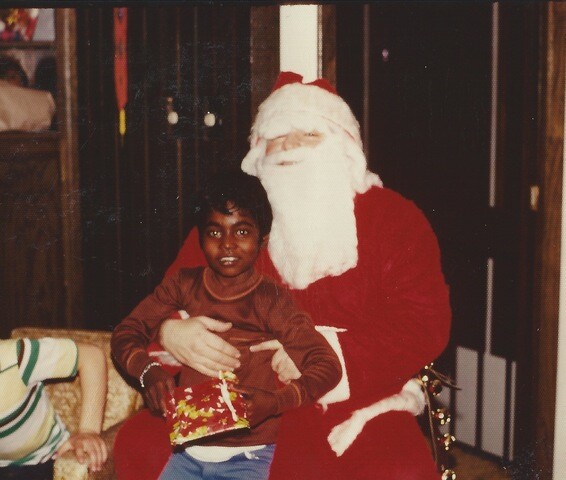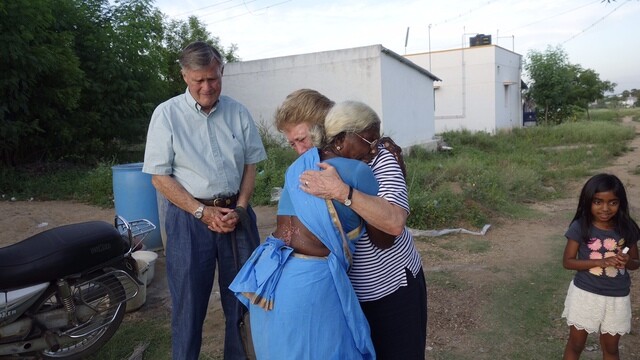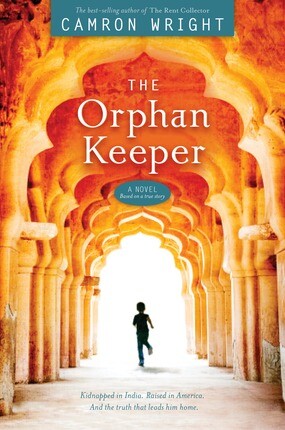Kidnapped from his village in India and sold to a Christian orphanage. Adopted and raised in Utah by a loving LDS couple who was told his parents were dead. Taj Rowland’s incredible journey is filled with twists and turns that would rival a blockbuster movie. And just when he had given up hope of ever seeing his birth family again, the Lord led him down a path that would defy all odds and guide him back home.
On a snowy night in December 1979, a young boy from India shivered from the cold and trembled with fear as he exited an airplane in Salt Lake City, Utah. Surrounded by white people speaking a language he didn’t understand, he clung in terror to the legs of the orphanage owner who was delivering him to his new adoptive parents. The boy kicked and screamed as he was wrapped in a warm blanket and put in the back of a car, sobbing himself to sleep on the way to his new home.
“The most frightening part was being taken away from everything that was familiar and being thrown into something that was completely different. I didn’t know exactly what was happening to me,” Taj Rowland recalls.
New Family, New Life
Fred and Linda Rowland had been searching for another child to adopt, but almost everything about their new son would come as a surprise.
“We wanted a little girl because we had already adopted two boys,” Fred explains. He and Linda were led to believe they were adopting a little girl around 2 or 3 years old. It was only hours before Taj began his journey to the U.S. that they learned they were being sent a boy approximately 8 years old instead.

“We had to make a decision fast,” Fred recalls. “We didn’t want our new child to be older than the first one we adopted. We prayed, and we talked about it. Then we went into separate rooms to think and pray about it independently. When we left each other, we probably weren’t going to do it, but after we separated, we both felt that he was our son and needed to come to our home.”
A couple weeks after his arrival, Linda pulled out a tape recorder. She knew that her new son, whose name was changed from Chellamuthu to Taj, would soon forget his native Tamil language. She recorded Taj singing a couple songs he learned at the orphanage. He then talked about his kidnapping. Unfortunately, his adoptive parents couldn’t understand what he was telling them, but they concentrated on loving him and helping him adjust to his new life.
“He was one frightened child,” Linda recalls. "It was months before he was ready to go anywhere."
Accustomed to living in a hut with a dirt floor and rummaging through garbage to find food, Taj struggled to understand that he would not go hungry.
“At first, I hid food under my bed and under my pillow,” he recalls. “My adoptive parents had to gently and constantly remind me, ‘Hey, there’s plenty to eat. You don’t have to worry about that.’”
He continues, “I remember telling myself, I have to forget there’s a past, and I have to figure out how to live now.”
The more Taj acclimated to his new surroundings, the more he suppressed his memories of India.
A Shocking Discovery
Fred and Linda enrolled their new son in wrestling and Scouting as soon as possible to help him socialize and become part of the community. About a year after his adoption, Taj participated in a wrestling tournament and won an award. Excited to show off his ribbon, Taj made a request in broken English that would shock his adoptive parents.
“He said, ‘Show mother, show mother,’” Linda recalls. “I said, ‘I am your mother.’ He said, ‘No, India mother.’"
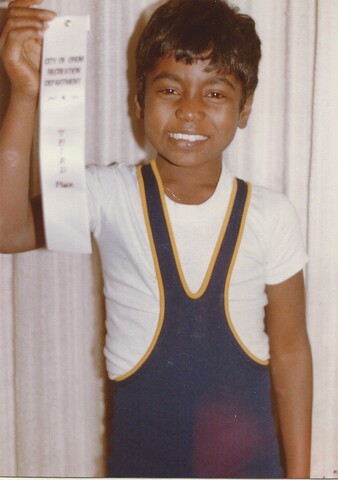
She continues, "We suddenly realized that this child might have a family. We asked, ‘What else do you have? A father?”
“Yes.”
“Who else?”
“Sister, brother, brother.”
Desperate for answers, the couple frantically began making calls and writing letters. But after months of extensive searching, all they found were dead ends.
“It broke our hearts, but we had to let it go,” says Linda. “We had to focus on getting him prepared for this life because this was where he was. It made us extremely sad, but we couldn’t do anything about it.”
Taj also did his best to keep moving forward, but eventually he would be forced to face his unresolved feelings about his identity and his past.
“I was never emotional,” he explains. “I never used to cry or get angry. In fact, my parents had a nickname for me: little volcano. I had stuffed all those feelings deep in my heart and didn’t allow them to come out. But when I was a senior in high school, I exploded. I was overwhelmed with thoughts of Who am I? Why did this happen to me? What am I all about?"
He continues, “I ran away from home. Mind you, I was the student body president and very involved in athletics. My worlds collided a little bit, but I recovered and served a mission because I always knew what was right, even though I was experiencing inner conflict.”
Unlocking the Past
In 1990, Taj was called to serve a mission in London, England, and assigned to live near Upton Park—an area with a large Indian population. But having grown up in an overwhelmingly white community in Orem, Utah, he was frightened of the residents at first.
“In the early ’80s, I was the only Indian for miles that I knew of,” he recalls.
The sights, sounds, and smells of the Indian community, however, would trigger memories of Taj’s native land that he had been repressing for years. “The colors of the clothing, the smells of the food, the brown skin—it was like unlocking childhood memories. I tasted Indian food for the first time [since being adopted], and it reminded me of being in my hut with my mother and my family, and me playing in the streets, river, and the parks.” As memories flooded Taj’s mind, he sketched a rough map of his village, though the name of it still eluded him.
Empowered by new clues to his mysterious past, Taj vowed to one day return to India and search for his family, undeterred by the fact that in a country with more than one billion people, the odds of finding them were infinitesimal.
“We always knew he would go back,” says Linda. “When he got home from his mission, he wanted to go to India as soon as he could earn the money. He wanted to find his mother, so we told him to try to hold on to those memories.”
After his mission, Taj attended Utah Valley University. Returning to India was a concrete yet distant goal for him, but a new friendship would trigger a chain of events that would take him to India sooner than he imagined.
In 1994, when a new Indian restaurant opened below Linda’s real estate office in Provo, Utah, she spoke with the owner, Daniel, and asked if she could introduce her son to him. “I wanted him to be around other Indians,” she explains.
“Daniel and I became friends really quickly,” says Taj.
One night, Taj noticed a photograph of Daniel’s sister Priya on the mantle. Though it seemed strange, he immediately felt he would marry this woman.
Unfortunately for Taj, Priya was living in Singapore. He tried to call her, but her father told him in no uncertain terms to never call back. Taj wasn’t deterred. He bought, packaged, and mailed to Priya what he believed was the greatest album of love songs known to the modern world—Air Supply: Greatest Hits. The two would finally meet in person when she came to Utah and both she and Taj attended Daniel’s house-warming ceremony. Priya was intrigued by Taj, and the two began dating despite her family’s belief in arranged marriages.
When the relationship became serious, Taj brought Priya to meet his parents. Linda began sharing stories of Taj’s childhood and pulled out a scrapbook. While looking through the pages, Priya noticed a letter—a response to Linda’s request for help finding Taj’s family.
“My heart was racing. The handwriting in the letter was so familiar,” Priya recalls. “I noticed that the letter was from my father! I was astounded and immediately felt a deep connection.”
She continues, “This was not a coincidence in my life. I knew in my heart that this was God’s plan for our paths to cross—I was the answer to Taj’s prayers. I was going to be the one who would be helping him find his history and roots.”
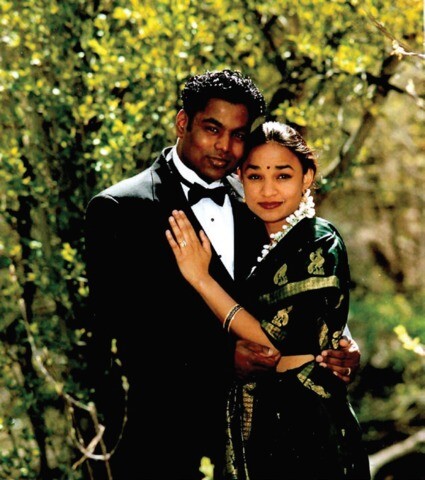
The Search Begins
Taj and Priya were married on May 22, 1996. The next year, Priya’s brother Emmanuel announced his wedding plans. Taj and Priya traveled to India for the ceremony, so Taj took advantage of the trip to his homeland to finally search for his birth family.
He couldn’t speak Tamil anymore, but with the help of a man named Christopher Raj, with whom Taj had done some business by phone and email, Taj began his search for answers in the city of Coimbatore at the Lincoln Home for Homeless Children—the orphanage from which he was adopted. Unfortunately, the orphanage had closed and the building was abandoned.
Drawing upon the memories of his abduction—being forced into a van, and then a jeep, and driven about three hours away—Taj and Christopher began searching cities within three hours of the orphanage. But nothing seemed to match Taj’s hand-drawn map.
Discouraged, Taj left to attend Emmanuel’s wedding. When the groom asked to see Taj’s map, he examined it and suggested Taj try searching the city of Erode.
“One of Emmanuel’s old mission companions, Isaac, took me around the city, but nothing looked familiar. The next morning I went back to my wife, but I told her, ‘I need to go back.’ I felt like I was inspired, that the Spirit was guiding me.”
Taking one last chance, Taj returned to Erode, circling the city in an auto rickshaw with Chris, Isaac, and Isaac’s father. When they were stopped at a traffic light, Taj heard a sound he remembered from his childhood—a man hacking coconuts. At that moment he realized he was in his old neighborhood. He jumped from the rickshaw and ran down the alley. The huts were gone and his family had moved away, but the landowner he knew as a child was still there.
“She told me that my brother Silvaraj started a fabric bleaching business about 10 years earlier. The problem was there were hundreds of bleaching factories in the city,” he says.
Still the men pressed forward, visiting different factories in search of Taj’s brother. They went from factory to factory with no success until eventually they felt inspired to visit a small bleaching factory on the edge of town. A man at the factory told them he knew Silvaraj and led them to his home.
A Miraculous Reunion
“We went through the jungle and came up on this dirt hill and a thatched mud hut,” Taj recalls. “There was a woman wearing a red sari that was flapping in the wind, with some little kids running around.”
Taj stayed behind while the other men asked to speak to the mother. “I wanted to be sure they were my family,” he explains. The woman hurried to the river where an old woman was bathing and told her someone was asking about Chellamuthu. Moments later, the old woman came running up the hill.
“Her hair was wet, and she was crying by the time she got to the top of the hill,” Taj recalls. “The Spirit told me she was my mother before she even said a word.”
The old woman, Arayi Gounder, immediately began describing all the distinguishing marks on Taj’s body, including some burn marks on the top of his feet and some disfigured fingers. She also told them how old he was when he was kidnapped. When she finally saw Taj, mother and son embraced for the first time in more than 18 years.
“It’s difficult to put into words—the sense of belonging, the joy of finding someone I had been searching for,” says Taj. “Language is not a barrier when it comes to the feelings of the heart.”
After an emotional reunion with his mother, Taj called his wife to tell her the joyous yet shocking news. “I said, ‘Priya, I found them.’ She couldn’t believe it.”
More family members gathered as news of Chellamuthu’s miraculous return spread through the village. Priya took a bus to Erode, and she and Chris acted as translators. They were able to explain to the family what had happened to Taj and where he had been all these years.
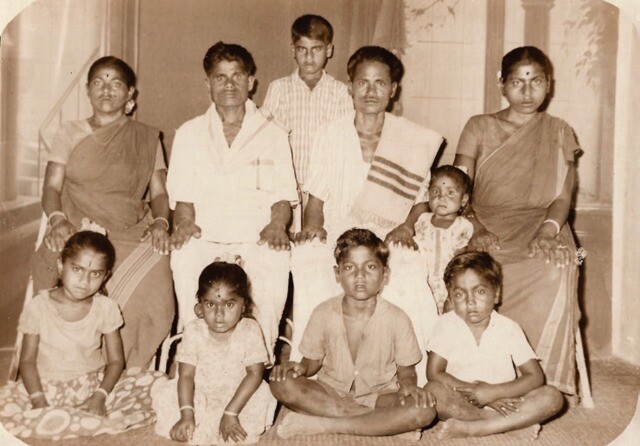
“Miracles do happen,” says Priya. “I was very nervous to meet his mother, but I was able to converse with her in Tamil and translate everything that Taj wanted to say to her. She told me that she had prayed everyday that someday she would find her lost little boy. She also shared her only treasured family picture with Taj as a little boy. Words cannot describe the joy I felt when I witnessed this beautiful, happy, and tearful reunion.”
Uniting Two Worlds
Since the reunion nearly 20 years ago, Taj has gone to great lengths to reconnect with his birth family and improve their meager circumstances.
“We go to India every year,” he says. “Between my mother and father, I have 17 aunts and uncles—two villages that are basically my family. About 15 years ago, we started TAPRISH, a nonprofit organization to help them with some businesses and to get them out of debt.”
Now Taj has business offices in India, where he employs people from nearby villages as much as possible. “We’re very much entrenched in India. I spend about six months a year there, and we spend every summer in India with our two daughters. And all this is done without me knowing the language,” he adds.
“Finding Taj’s family has provided us with a sense of comfort and closure to our lives,” says Priya. “We have been blessed to be able to help his family, who has very little. This has brought Taj and me closer together. We feel a strong sense of responsibility toward his family and that Heavenly Father was guiding us for a greater purpose in life.”
In June of 2015, the uniting of Taj’s family became complete when his adoptive parents flew to India to meet Taj’s birth family for the first time.
“It was so frightening to me,” Linda recalls. “I didn’t know what Taj’s mother would think of us—what she knew and what she didn’t know. That only lasted until we saw each other. Then everything melted away, and it was just mother to mother.”
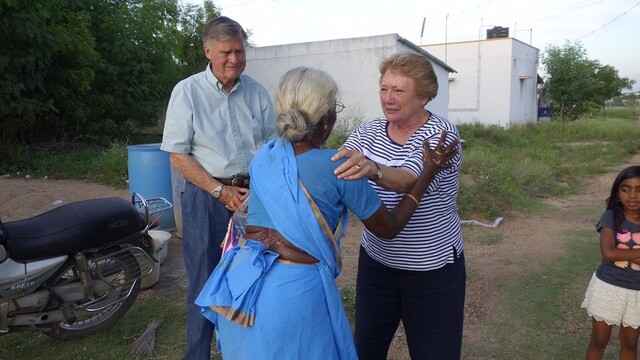
Linda had made a photo album for Arayi—pictures of their house, the mountains, Taj’s school, his college graduation, and other important moments in their son’s life.
“It was a wonderful experience,” says Linda. “She thanked us for taking care of her son and for making him the man he was. It’s a testimony that the Lord is involved in our lives—the smallest things or the biggest things. Every child has a story. The Lord helps them get where they need to be.”
“There is a greater power that guides our lives,” says Taj. “We need to trust that there is a rhyme and reason for our purpose here. If God cares about a poor, young, uneducated boy from a village in India, then there is hope for everyone.”
Photos courtesy of Taj Rowland.
Read more about Taj Rowland’s gripping journey of self-discovery in The Orphan Keeper, by best-selling author Camron Wright.
“My hope in sharing this story is to give hope—to make a change in the world. That’s the reason the book came out,” says Rowland.
Pick up your copy of this inspiring story at Deseret Book stores or deseretbook.com.
